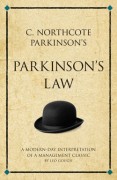Efficiency in business: The relevance of Parkinson’s Law in the twenty-first century
25 June 2013 by Admin in Book publishing
It is a commonplace observation that work expands so as to fill the time available for its completion. Thus, an elderly lady of leisure can spend the entire day in writing and despatching a postcard to her niece at Bognor Regis. An hour will be spent in finding the postcard, another in hunting for spectacles, half-an-hour in a search for the address, an hour and a quarter in composition, and twenty minutes in deciding whether or not to take an umbrella when going to the pillar-box in the next street. The total effort which would occupy a busy man for three minutes all told may in this fashion leave another person prostrate after a day of doubt, anxiety and toil.
Cyril Northcote Parkinson, The Economist, 1955
Infinite Ideas author Leo Gough recently featured in this Radio 4 broadcast, commenting on the relevance of C. Northcote Parkinson’s fascinating theory first summarised in an article written almost fifty years ago.
 As you might have learned from the behaviour of the elderly lady in Bognor Regis, Parkinson’s Law examines the misuse – by individuals and by the companies they work for – of time, energy and resources. Put simply (and rather brutally), employees might seek to secure their positions, or individuals might seek to fill their time, by creating unnecessary work for themselves – giving rise to waste and inefficiency. Although delivered in a satirical style Parkinson’s book presents an acute analysis of organisational behaviour, which can be used for solving problems, maximising efficiency and increasing productivity.
As you might have learned from the behaviour of the elderly lady in Bognor Regis, Parkinson’s Law examines the misuse – by individuals and by the companies they work for – of time, energy and resources. Put simply (and rather brutally), employees might seek to secure their positions, or individuals might seek to fill their time, by creating unnecessary work for themselves – giving rise to waste and inefficiency. Although delivered in a satirical style Parkinson’s book presents an acute analysis of organisational behaviour, which can be used for solving problems, maximising efficiency and increasing productivity.
Fundamentally opposed to deeply ingrained practices and, historically, class-based structures, Parkinson champions freedom from bureaucracy. For a business this could mean favouring individual productivity over reliance on overpaid executives and hierarchical systems, but it can be applied within all institutions, organisations and government.
Parkinson’s observations are as pertinent now as they were back in the mid-twentieth century. Look down the business bestsellers chart on Amazon and it’s clear that people need, demand and indeed consume huge quantities of personal development content, believing it will help them to function in a confusing and often stressful working environment where they may feel undervalued, dispensable or even redundant.
 So how accurate were Parkinson’s observations? Very, apparently. Listen to the Radio 4 broadcast to find out how mathematicians have analysed Parkinson’s theories and proven them to be correct and precise. Or check out our modern-day interpretation of Parkinson’s Law for more contemporary examples demonstrating the truth of Parkinson’s Law.
So how accurate were Parkinson’s observations? Very, apparently. Listen to the Radio 4 broadcast to find out how mathematicians have analysed Parkinson’s theories and proven them to be correct and precise. Or check out our modern-day interpretation of Parkinson’s Law for more contemporary examples demonstrating the truth of Parkinson’s Law.
If, at some point in the future, you happen to be made redundant from work by somebody who leaves the office earlier than you do or suddenly develop a passion for the alphabetical order of your filing cabinet, or find yourself slaving over a postcard for your Mum (who you spoke to last night) perhaps you’ll remember Cyril and consider that he may just have had a point.
